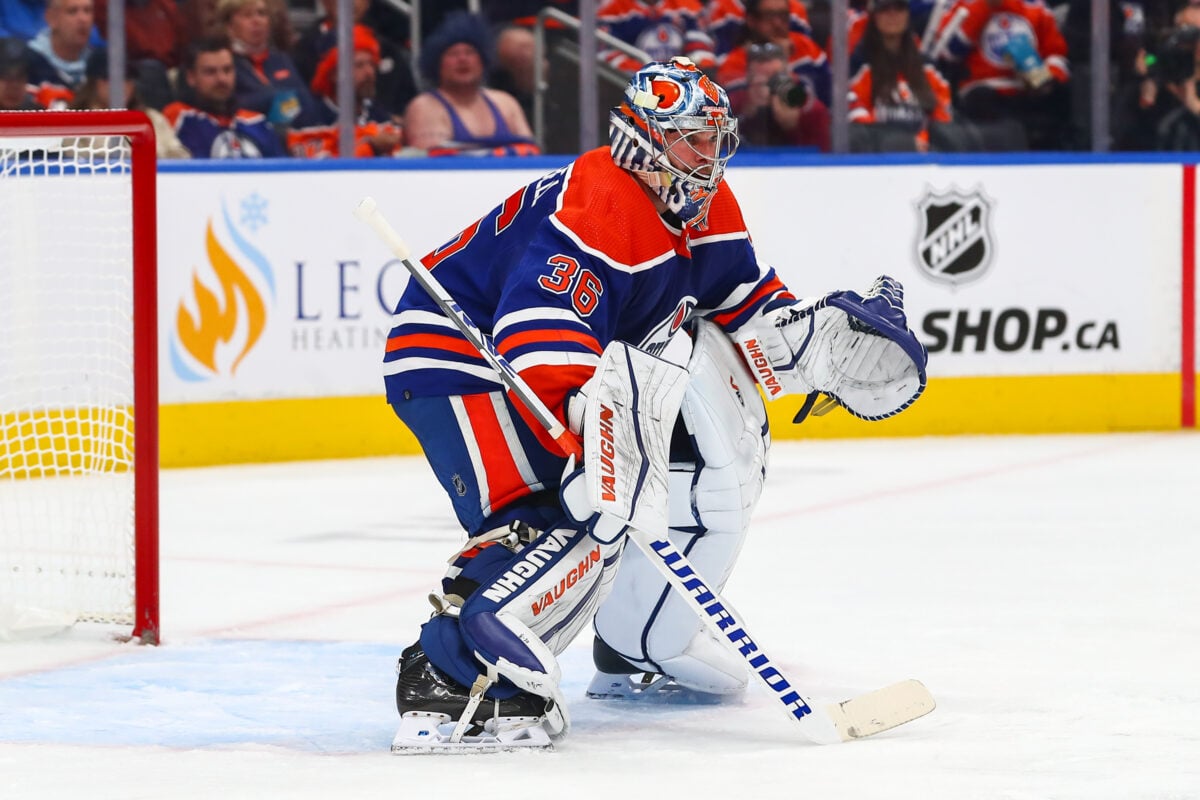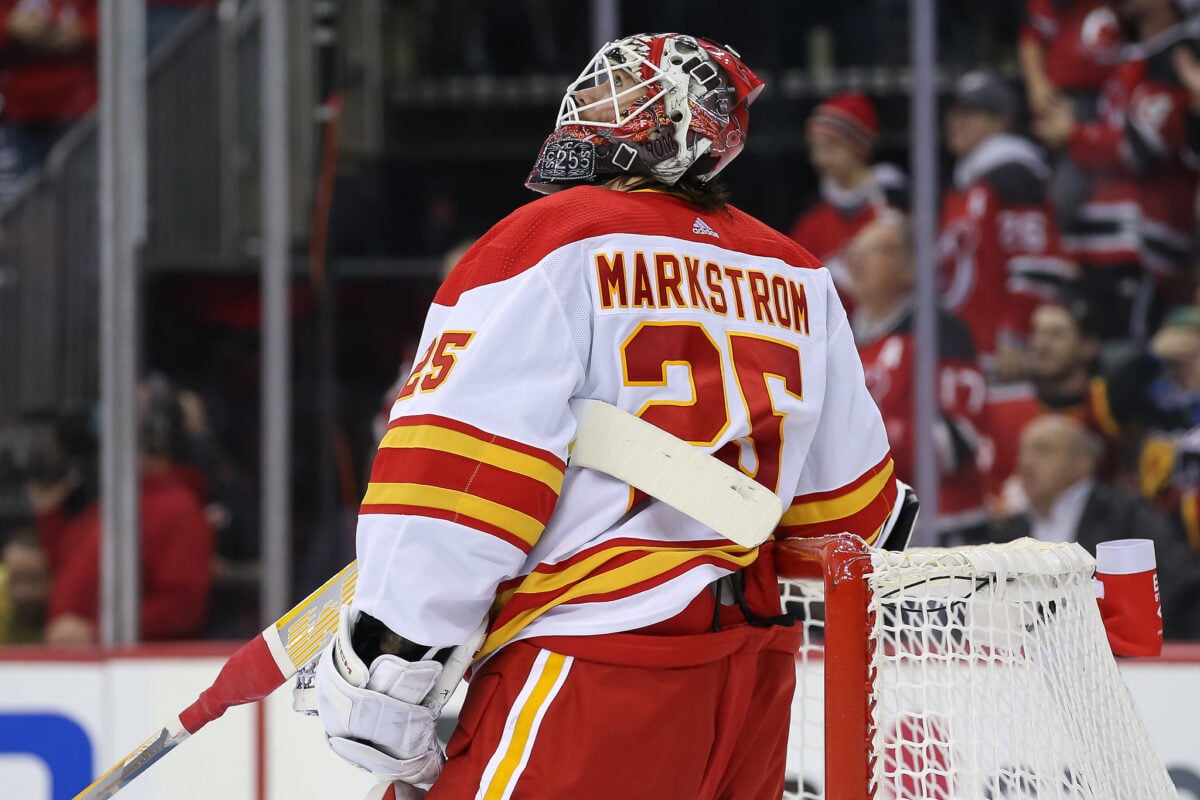It’s very clear to anyone who has watched the Edmonton Oilers or even checked the stat sheets that Jack Campbell has not had the start he or the team was hoping for. His numbers this season are far lower than any other point in his career and he is being paid $5 million average annual value (AAV) to be Stuart Skinner‘s backup. Trade rumours have swirled this season, but other solutions have been brought up as well. The Oilers should stand pat for at least another year before making any major decision, and I’ll get into why.
Related: Oilers’ Goaltending Option if Skinner Passes Campbell as Starter
Give credit to Campbell, he has started to improve and play some good hockey in net. But it’s going to take a lot more work to fix his numbers this season as he still sits at a 3.69 goals-against average (GAA), .878 save percentage (SV%), and a minus-13.6 goals save above average (GSAA). Those numbers have gone up a bit from where they were sitting before Skinner started getting the majority of the starts. If Campbell could post a SV% of .900-plus from here on out, the Oilers would be able to turn things around in a major way since they have an easy time scoring goals this season.
Many Wanted Campbell Gone
Campbell was winning games at the start of the season, more so than Skinner. But the goal support wildly differed. The Oilers were having to score five or six goals to win games when Campbell was in net while they only had to score three or so with Skinner in net. This led to the decision to start Skinner in more games as of late.

At this point, Skinner hadn’t been signed to his three-year deal yet. Many were realizing the kind of bad decision it was to give out $25 million over the next five years to a starter who isn’t starting when the team has cap trouble. This created trade rumours and speculation as to what the Oilers could do with Campbell. Whether it was a trade back to the Toronto Maple Leafs, a swap for Cal Petersen with the Los Angeles Kings, a trade to another team who had the cap to take on Campbell’s contract, or a demotion to the American Hockey League (AHL), the pressure was on in Edmonton .
Trading Campbell Would Be Very Costly for Oilers
Trading Campbell would be far too costly for the Oilers to even consider half a year into his five-year deal. He is at his very lowest in his career right now and has proven in the past he can play elite level hockey while also being able to bounce back from poor stretches.
Despite being an All-Star last season, it means nothing to a team acquiring him if all they are focusing on is his very poor numbers this season. At minimum it will cost the Oilers a first-round pick to start the conversation. Four and a half years is a long period of time and it sometimes costs teams a first-round pick or close to it to get rid of a player with one year remaining (ex. Sean Monahan). Then it looks pretty bad on the team trading away the player if he starts to return to form. I’ll take you back to the last time the Oilers gave up on a goalie after he started to struggle: Cam Talbot. He quickly found his game and played great for the Calgary Flames, Minnesota Wild, and now the Ottawa Senators (from “Mindbender: Are Campbell and Skinner set for rollercoaster ride this year? You betcha”, Edmonton Journal, Nov. 1, 2022).
Oilers Right to Wait it Out
It was the right decision for the Oilers to run with Skinner while he was hot and Campbell was struggling. No matter what season it is or how good a starting goalie has been in the past, they will struggle at one point in their career. The Oilers or any team should always be looking to put out the players and goalie who will best give them a chance to win. While Skinner has now had a few underwhelming starts, Campbell has gotten the opportunity to take the net back and hasn’t disappointed in a few of his previous starts.
The best example I can go back to as a comparison to Campbell is Jacob Markstrom’s recent career path. He became a free agent with the Vancouver Canucks and then signed with Calgary for six years at $6 million AAV. He had great numbers throughout the five seasons he spent with the Canucks, but posted the best numbers in his final season and finished fourth in Vezina Trophy voting. Campbell similarly played well in Toronto before testing free agency.

Markstrom struggled in his first season with Calgary, finishing with a .904 SV% and a minus-4.0 GSAA. He bounced back in a major way with a 2.22 GAA, .922 SV%, nine shutouts, and a 26.1 GSAA to finish second in Vezina Trophy voting last season. I don’t think Campbell will rebound to that extent, but he should be able to raise his SV%, GSAA, and overall play as he gets more comfortable in a new role and style of play of the Oilers.
You may also like:
- Oilers Week Ahead: Schedule & Storylines – Trade Deadline, Mangiapane, Centre Search and More
- Oilers Place Andrew Mangiapane & Alec Regula on Waivers
- NHL Rumours: Thomas to Mammoth, Henrique Staying & Kings Forward Hunting
- Oilers’ Chances of Winning the Cup Being Held Back by Nurse & His Contract
- NHL Morning Recap – March 1, 2026
Many NHLers, skaters or goalies, sometimes take a while to adjust to a new team. That is why the trade deadline is a risky time to make major splashes. It’s also why teams have started to have more interest in players with more than a year left on their contracts. Campbell is just 17 starts into his Oilers career and has lots of hockey left to play. He is letting in fewer bad goals and is getting much more comfortable in Edmonton. It can only go up from here and patience is going to pay off for the Oilers sooner than later if they wait it out and stick with Campbell.